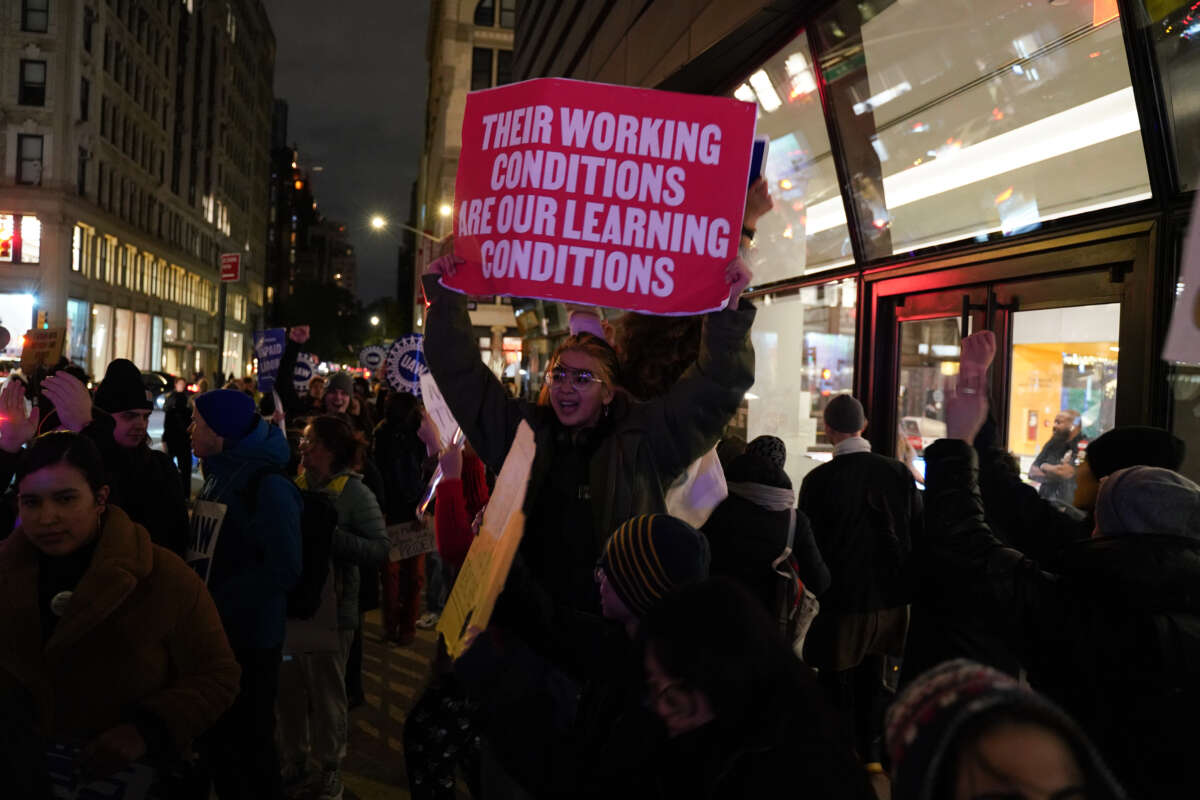Truthout is a vital news source and a living history of political struggle. If you think our work is valuable, support us with a donation of any size.
Labor rights advocates nationwide celebrated after part-time faculty at the New School in New York City reached a tentative collective bargaining agreement with the higher education institution late Saturday, ending a strike that has spanned more than three weeks.
“Collective action and worker solidarity wins!”
“WE WON! We won our fair contract,” tweeted Natasha Lennard, a columnist at The Intercept who also teaches at the school. “Strikes work!! Solidarity works!!!”
Other instructors, students, and groups — from a union at Rutgers University in New Jersey to the New York City Central Labor Council, AFL-CIO — welcomed the development as a win for workers.
As The New York Times summarized: “The sizable walkout had left the school at a near standstill. Classes were paused because nearly 90% of the faculty is made up of untenured adjunct professors and lecturers. The school had also been facing a lawsuit from irate parents, who had threatened to withhold payment or force their children to transfer to other institutions. Some had called for the school’s president, Dwight A. McBride, to resign.”
The ACT-UAW Local 7902 represents about 2,600 part-time faculty at the school, including about 1,500 who are teaching this semester but walked off the job on November 16. The union’s bargaining committee unanimously endorsed the new deal, which must now be ratified by members.
The union committee and school said in a joint statement that “this is a strong, fair, five-year contract that increases compensation significantly, protects healthcare benefits, and ensures that part-time faculty are paid for additional work done outside the classroom to support our students.”
“We want to share our sincere gratitude to the members of both the union and university bargaining teams for their dedication and tireless work, and to our mediator, Commissioner William Domini, for helping both sides get to this agreement,” the statement added. “Now, together, we can return to our mission of teaching, learning, creating, and supporting our students.”
Lennard called the members of the union’s bargaining committee “superheroes,” expressed her excitement about returning to the classroom with her students, and said that “their solidarity has been amazing.”
The action — which came amid a wave of labor organizing across the country — was the longest adjunct strike in U.S. history, according to Teen Vogue news and politics editor Lexi McMenamin, who recently completed a master’s program at the university.
“The New School self-describes as a ‘progressive university,‘ and it’s that quality that has attracted many of its students and workers, past and present — myself included,” McMenamin reported Thursday. “Those following the strike have expressed disgust at university messaging that used the language of scholars such as bell hooks to defend its resistance to bargaining with the union.”
Students on Thursday began occupying the New School’s University Center after the institution announced earlier in the week that it was cutting off wages and contributions to health insurance and retirement benefits for striking teachers. The Student Faculty Solidarity group said on Instagram that “we do not take occupation lightly, but the New School has left us no choice.”
A related Instagram account run by those participating in the occupation shared a long message following the end of the strike:
The students who are currently occupying the University Center celebrate the news of a tentative agreement between the union and the university. It is a massive win of the New School community over the greed and disrespect of the university administration.
At the same time, we underscore that this is not the end. The university administration failed, disrespected, and threatened this community. It is naive to think that having reached this agreement after 26 days of strike means that Monday we will go back to business as usual. In this battle, the whole university community came together as never before. This is just the beginning.
The students also announced a 2:00 pm ET event at the University Center for all members of the New School community.
“Call it a celebration, call it a town hall; we need to ask ourselves: What now?” the group said. “Students, part-time faculty, staff, full-time faculty, the admin itself: let’s all come together tomorrow and have a discussion. WE are the New School; it is up to us to decide what happens next. We cannot lose this momentum.”
A terrifying moment. We appeal for your support.
In the last weeks, we have witnessed an authoritarian assault on communities in Minnesota and across the nation.
The need for truthful, grassroots reporting is urgent at this cataclysmic historical moment. Yet, Trump-aligned billionaires and other allies have taken over many legacy media outlets — the culmination of a decades-long campaign to place control of the narrative into the hands of the political right.
We refuse to let Trump’s blatant propaganda machine go unchecked. Untethered to corporate ownership or advertisers, Truthout remains fearless in our reporting and our determination to use journalism as a tool for justice.
But we need your help just to fund our basic expenses. Over 80 percent of Truthout’s funding comes from small individual donations from our community of readers, and over a third of our total budget is supported by recurring monthly donors.
Truthout’s fundraiser ends tonight! We have a goal to add 143 new monthly donors before midnight. Whether you can make a small monthly donation or a larger one-time gift, Truthout only works with your support.
